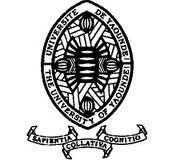Our research groups
African-German Network in Mathematical Sciences and Applications (AFRI-GER-MATH-NET)
The Humboldt Laboratory for Digital and Pedagogical Mathematics conducts research in mathematics and is established at the University of Yaoundé 1 as part of the Alexander von Humboldt Prize for Innovative Network Initiatives obtained in 2012 by Professor Mama Foupouagnigni, founder and coordinator of the laboratory. Research activities carried out in this laboratory include digital mathematics and mathematics pedagogy, as well as educational technologies (e-learning).
The Alexander von Humboldt Alumni Award for Innovative Networking Initiatives was created by the Alexander von Humboldt Foundation (Bonn, Germany) to promote innovative initiatives that can help strengthen the networking of Alexander von Humboldt Foundation alumni. The award is designed to support initiatives that are not supported by existing scholarship programs, as well as to promote academic and cultural relations between Germany and the countries of former Humboldt scholars, while strengthening their collaboration.
Professor Mama Foupouagnigni is Professor of Mathematics in the Mathematics Department of the École Normale Supérieure, University of Yaoundé, and Academic Director of AIMS Cameroon (African Insitute of Mathematical Sciences). He holds a PhD in Mathematical Physics (National University of Benin, 1998) and a Habilitation in Mathematics (University of Kassel, June 2006). His main areas of research are orthogonal polynomials, special functions in mathematical physics, approximation theory, e-learning and educational mathematics. He was head of the national and inter-African cooperation department and deputy coordinator of the virtual university.
AGNES (African German Network of Excellence in Science)
The German-African Network for Excellence in Science has been launched by the Alexander von Humboldt Foundation in collaboration with researchers from various African countries. The new network held its inaugural conference in Addis Ababa, Ethiopia, from November 16 to 18, 2011. The AGNES network is designed to raise the profile of the key role played by research and innovation in sustainable development in sub-Saharan Africa. Leading researchers from the region wishing to work more closely with each other and with colleagues in Germany are taking part. The aim is also to encourage young people to get involved and pursue a career in scientific research.
AGNES is committed to supporting social change in Africa by making academic excellence a socially recognized criterion for career advancement. Whereas in the past, heads of academic institutions, for example, were often appointed on the basis of seniority, they are now increasingly highly qualified young academics. They are expected to build genuine research institutions capable of asserting themselves both nationally and internationally. The founding of a German-African network for excellence in science was intended to create a supra-regional contact structure to strengthen academic excellence in sub-Saharan Africa, going beyond the Humboldt network in its narrowest sense. The DAW Center hosted the AGNES network in its midst between 2012 and 2015.
AGNES workshops
From January 2012 to December 2014, the Executive Board of AGNES (African German Network of Excellence in Science) met at its headquarters at the DAW Center. Also as part of AGNES activities, two workshops were held at the DAW center in 2013 and 2014, as was already the case in 2012. During these workshops, members of the AGNES committee met for various purposes, including the selection of candidates for the academic awards presented by the network. The DAW Center also coordinated the network's activities and operations between 2012 and 2014.
Health Focus Project - IRES-Group
This public health project, led by Dr. Rogers Ajeh, involves carrying out a CAP study on behalf of OCEAC, with Cameroon as the place of intervention and study conduct. The aim is to carry out field surveys in order to ensure compliance with the ToR. The project runs from 1ᵉʳ September 2022 to 31 March 2023.
To find out more, go to https://www.iresgroup.org




